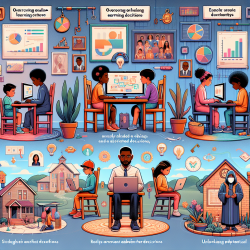Introduction
As practitioners committed to improving outcomes for children, staying informed about the latest research in genomics can significantly enhance our approach to treatment. The study titled "From karyotypes to precision genomics in 9p deletion and duplication syndromes" offers groundbreaking insights into these complex syndromes, which are often associated with developmental delays and other neurodevelopmental disorders. This blog will explore how practitioners can leverage the findings from this research to refine their therapeutic strategies and improve patient outcomes.
The Power of Precision Genomics
The study provides a comprehensive analysis of 719 individuals with 9p deletion and duplication syndromes, making it the largest cohort studied to date. By employing modern genomic technologies, such as long-read sequencing, researchers have been able to achieve precision genomics, which involves determining all possible relevant genomic variations within an individual to the precise nucleotide.
For practitioners, this means a more accurate understanding of the genetic underpinnings of 9p syndromes, allowing for more tailored and effective therapeutic interventions. The ability to pinpoint specific genetic variations can help in predicting phenotypic outcomes, which is crucial for developing individualized care plans.
Implementing Research Outcomes in Practice
Practitioners can harness the insights from this research in several ways:
- Enhanced Diagnosis: Understanding the genetic basis of 9p syndromes can lead to more accurate diagnoses, enabling practitioners to identify the specific needs of each child more effectively.
- Tailored Interventions: With precise genomic data, speech-language pathologists can design interventions that are specifically targeted to the genetic profile of each child, potentially improving speech and language outcomes.
- Collaboration with Geneticists: By working closely with geneticists, practitioners can stay updated on the latest advancements in genomics, ensuring that their therapeutic approaches are informed by cutting-edge research.
Encouraging Further Research
While the study provides valuable insights, it also highlights the need for ongoing research to fully understand the complexities of 9p syndromes. Practitioners are encouraged to engage in collaborative research efforts and contribute to the growing body of knowledge in this field. By participating in research, practitioners can help to refine precision genomics techniques and improve the accuracy of genotype-phenotype correlations.
Conclusion
Precision genomics is revolutionizing our understanding of complex genetic syndromes like 9p deletion and duplication. By integrating these insights into practice, practitioners can enhance their diagnostic and therapeutic capabilities, ultimately leading to better outcomes for children. As we continue to explore the potential of precision genomics, collaboration between researchers and practitioners will be key to unlocking new possibilities in personalized medicine.
To read the original research paper, please follow this link: From karyotypes to precision genomics in 9p deletion and duplication syndromes.










